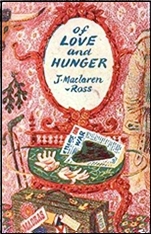Wed 13 Aug 2025
Reviewed by Tony Baer: JULIAN MacLAREN-ROSS – Of Love and Hunger.
Posted by Steve under Reviews[8] Comments
JULIAN MacLAREN-ROSS – Of Love and Hunger. Allan Wingate, UK. 1947. Reprinted a number of times.

Fanshawe’s about 30, jaded, in 30’s London between the wars. And broke. Trying to sell vacuum cleaners door to door. Unsuccessfully.
“The new bloke’s name was Roper. Soon as I set eyes on him I knew he’d never make a salesman. He was about twenty-four and not very tall, and he’d a pink face with a long pointed nose and blond hair slicked straight back with the pink puckered skin of a scar running up into the roots of it. The scar looked odd on him somehow: he didn’t seem the kind of chap who’d have a scar like that. You’d never think he’d been to sea. That’s how he got the scar: a lascar with a bottle in Marseille.
…
“Sukie was his wife. She’d a job in the cash-desk at Morecombe’s, dress shop down by the Arcade. Sultry-looking piece. Spanish type. Black hair, dark eyes, lot of lipstick on. Hell of a temper, you could see. We’d never actually met, but I didn’t like the look of her at all.”
Roper decides to quit and go back to sea. Look after my wife for me while I’m away, he says. See that she doesn’t get lonely.
Fanshawe does. And so it begins. A torrid affair, but not for long. And Roper returns.
And without further ado, Hitler invades Poland, and Fanshawe goes to war.
The end.
A tightly written, slangy slice of hardscrabble life in 30’s London. I dug it.
August 13th, 2025 at 2:53 pm
The author’s Wikipedia page is here:
https://en.wikipedia.org/wiki/Julian_MacLaren-Ross
and this is the first paragraph:
“Julian Maclaren-Ross (7 July 1912 – 3 November 1964) was a British novelist, short-story writer, memoirist, screenwriter, and literary critic.”
I have not read this book, but I imagine it is about as far from mystery fiction as you can get. (I may be wrong.)
August 13th, 2025 at 3:30 pm
Steve,
It’s no mystery. But the lingo’s quite hardboiled. Which is what pulled me into its orbit. I can happily read most anything if it’s hardboiled enough. But flaccid florid prose? Yech. I don’t care how great your story is. I can’t read it if it’s covered it up with silken patterned pillows and drapes, drowned in coverlets of endless description and dialogue lifted from bubblegum wrappers.
August 13th, 2025 at 4:52 pm
I hope I’m not putting words in your mouth, but it sounds as though you need an edge to what you’re reading, and this is a book that did that for you. (No doilies!) I’m still not likely to read it, but I’m more than happy to have read about it. Thanks!
August 13th, 2025 at 6:44 pm
Steve,
I guess you could call it an edge…..what I’m looking for is visceral verisimilitude. I want something real, authentic, cut close to the bone. George Bataille put it well:
“To a greater or lesser extent, everyone depends on stories, on novels, to discover the manifold truth of life. Only such stories, read sometimes in a trance, have the power to confront a person with his fate. This is why we must keep passionately striving after what constitutes a story: how should we orient our efforts to renew or, rather, to perpetuate the novel?
Many minds are no doubt preoccupied with various techniques that will compensate for the surfeit of familiar forms. But what is the point in this – assuming that we wish to find out what a novel might be – unless first of all a ground is ascertained and clearly delineated? A story that reveals the possibilities of life is not necessarily an appeal; but it does appeal to a moment of fury without which its author would remain blind to these possibilities, which are those of excess. Of this I am sure: only an intolerable, impossible ordeal can give an author the means of achieving that wide-ranging vision that readers weary of the narrow limitations imposed by convention are waiting for.
How can we linger over books to which their authors have manifestly not been driven?”
August 13th, 2025 at 7:55 pm
Now there’s a man who knows what he’s talking about.
August 14th, 2025 at 5:03 am
Maclaren-Ross was a great weirdo – alcoholic, amphetamine-taker, gaoled for debt and sleeping on park-benches. He had an amour fou for George Orwell’s widow. His short stories and other people’s writings are what keeps him remembered.
He was the original for Anthony Powell’s X. Trapnell in A Dance to the Music of Time (Powell had to tone him down drastically to make him convincing) and wrote a couple of crime novels later in life. They weren’t very good and had to be published in the Isle of Man, as he’d taken advances from so many London publishers that a novel published in London would have left him bankrupt when he’d repaid them.
Finally he sobered up, married Leonard Woolf’s niece, had a son, began writing well-praised memoirs and with characteristic timing died of a heart attack aged fifty two.
August 14th, 2025 at 5:06 am
Whoops!
Maclaren-Ross wasn’t gaoled for sleeping on park-benches. He merely often slept on park-benches (station waiting rooms, Turkish baths – that’s what he said! – and Circle Line trains.)
August 23rd, 2025 at 3:50 am
One of those names I had seen around a lot but hadn’t read. Maybe I should correct that.